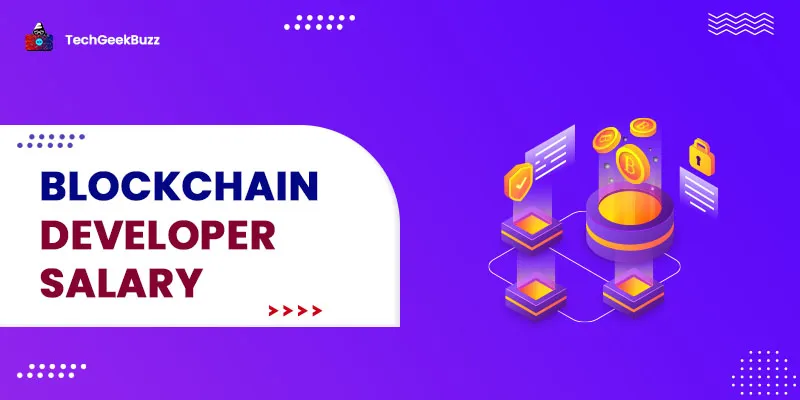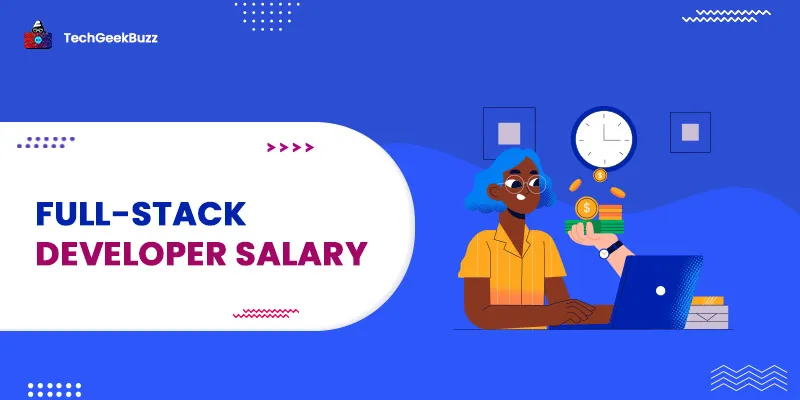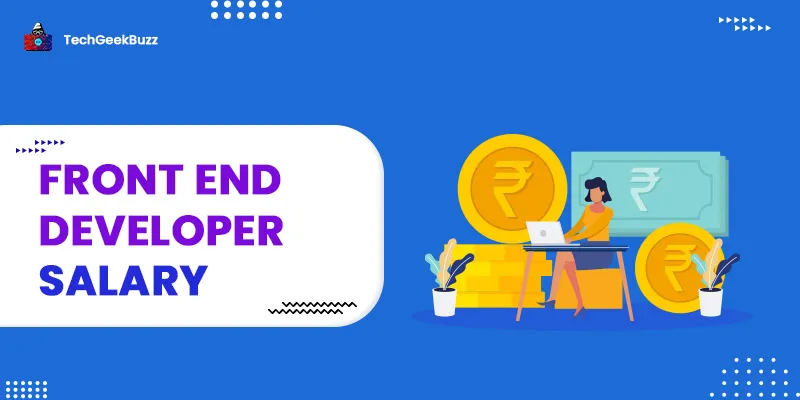Whenever we hear the term ‘blockchain’, another popular term flashes across the mind, and that is Bitcoin. Bitcoin is a popular and well-known cryptocurrency for which blockchain was introduced. Blockchain is an in-demand technology in today’s era that enables the existence of cryptocurrencies.
Basically, a blockchain is a distributed ledger or database that stores information, more specifically transactional records, electronically in a digital format. This digital information is stored in the form of blocks, where each block is linked to its next block, forming a chain. Hence, the name blockchain. It lets the owner of the information directly access it without the need for mediators or trusted third parties.
It is important to note that blockchain is not only about Bitcoin. Instead, it is something more than that which is transforming the functioning of the digital world efficiently and securely. As blockchain is gaining traction in today’s digital epoch, blockchain professionals are highly sought-after by many tech giants, including Samsung, Capgemini, and IBM.
If you are seeking to have your career as a blockchain developer and want to gain insights into the salary of a blockchain developer, you have landed at the right place.
In this blog post, we shall make you aware of the salary of a blockchain developer in India and other countries. Also, we will briefly introduce you to blockchain technology, who is a blockchain developer, and the essential skills required to become a blockchain developer.
What is a Blockchain?
A blockchain is a decentralized or distributed, immutable ledger that stores the transaction records made in various cryptocurrencies, such as Bitcoin, across various computer systems that are interconnected over a network. As it is an immutable ledger, transactional records stored in blockchain are not reversible and alterable.
Each block stores a specific number of transaction records. Whenever any transaction takes place, its record is duplicated across all the computer systems connected over a network. Also, the record of the occurring transactions is added to a ledge of all participants involved in that transaction.
The Popularity of Blockchain
This cutting-edge technology has drastically transformed the way of managing data and performing business transactions. Initially, blockchain was developed only in support of Bitcoin. However, blockchain has grown so versatile that various companies and organizations are embracing it.
According to Statistatia , in 2018, the global spending on blockchain was $1.8 billion. However, by 2023, it is estimated that this huge number will grow to $15.9 billion. Furthermore, Garneter’s new forecast methodology states that the business value-add of blockchain is anticipated to reach $175 billion, while it is predicted to exceed $1.3trillion by 2030.
Businesses are increasingly using blockchain as it has developed into a safe, immutable method of storing sensitive data. It provides unparalleled data security. Such widespread use of blockchain has increased the number of job opportunities for blockchain developers.
Who is a Blockchain Developer?
A blockchain developer is a professional who is in charge of working on blockchain technology. Also, they perform various tasks, including designing and improving blockchain protocols, which generally entails designing a network used for data centralization and decentralization and building smart contracts.
The day-to-day tasks of blockchain developers involve creating and optimizing algorithms that are in compliance with and run on the blockchain protocol, which acts as the internet for blockchain-enabled applications. In addition, they are in charge of developing applications that conform to the standard of Web 3.
Furthermore, there are two broad categories of blockchain developers, namely core blockchain developers and blockchain software developers. A core blockchain developer designs blockchain architecture and makes high-level decisions, such as which system protocols to use, which consensus mechanism is suitable, and more. On the flip side, blockchain software developers leverage architecture and protocols to create decentralized applications.
Roles and Responsibilities of a Blockchain Developer
Depending on the category, a blockchain developer has different responsibilities. Let's go through some of the crucial duties that both sorts of blockchain developers must perform.
Core Blockchain Developer: As its name suggests, a core blockchain developer works with blockchain technology at the root level. They are in charge of:
- Creating, maintaining, and monitoring the network architecture.
- Designing and enhancing blockchain and consensus protocols.
- Putting blockchain functionality and features into practice.
- Supervising the whole network.
Blockchain Software Developer: Blockchain software developers are experts who have extensive experience working with blockchain technology. Among their responsibilities, the following are the basic ones:
- Developing APIs for blockchain integration.
- Building the front-end and back-end of decentralized applications.
- Developing and implementing smart contracts.
- Monitoring the complete stack while decentralized applications are running.
Skills Required to Become a Blockchain Developer
As a blockchain developer, it is mandatory to possess a thorough knowledge of popular programming languages, such as Java, C++, C, and Python. In addition, you should hold knowledge of mathematics and algorithms and various other technologies, including Mist, Truffle, BaaS, Parity, Solium, and Remix. Along with these, you must master the following skills to become a blockchain developer:
-
Blockchain Architecture
Whether you choose to become a core blockchain developer or a blockchain software developer, it is essential that you must hold an in-depth understanding of blockchain architecture. You must know what blockchain technology is made up of and how it works.
As there are four types of blockchain architectures, namely public, private, hybrid, and consortium, you should be familiar with all these four types. Furthermore, you should have a better grasp of concepts such as hash functions, cryptography, smart contracts, distributed ledgers, and consensus.
-
Data Structures
A data structure in programming is the way of organizing and storing data in such a way that it can be accessed and managed quickly and easily. As blockchain is all about storing cryptographic transaction records or sensitive information, it is essential for you to have a thorough understanding of data structures.
As discussed above, blockchain stores data in the form of blocks. So, each block is a type of data structure that stores multiple transactions. Furthermore, you should be acquainted with various data structures, including hash trees, heaps, graphs, Markle trees, and Patricia trees.
-
Cryptography
Cryptography is a practice that involves using methods that make use of codes to secure information and communication such that only the intended recipients should be able to interpret and process it. As a blockchain developer, it is your responsibility to provide secure blockchain environments; effective cryptography comes in handy to accomplish this.
You will also be tasked with preventing unauthorized access to data, for which you should know techniques to leverage the public-key cryptography. Moreover, you should be very well aware of cryptographic practices, such as digital signatures, wallets, and keys and hash functions, including SHA-256 and Keccak-256.
-
Smart Contract Development
Smart contracts are simply computer programs or transaction protocols that execute automatically when specific conditions satisfy and allow two parties to exchange services or goods. It does not involve mediators.
As smart contracts are at the heart of blockchain development, you must thoroughly understand exactly what they are and how they work. In addition, you should be familiar with the programming languages used for developing smart contracts, such as Solidity, Chaincode, and Vyper.
-
Web Development
As blockchain has its major focus on decentralized applications that run on Web 3, web development and blockchain work well together. So, you should strongly understand how to design and develop websites. Also, you should know about the technologies to support those websites and optimize and secure them.
Want to master web development from the ground up? Check out the course here .
-
Programming Languages
It is obvious that you require knowledge of various programming languages to become a blockchain developer. However, the use of programming languages depends upon the platform you choose to implement the blockchain environments. It is not essential to master all programming languages, but having proficiency in some popular languages, such as C, C++, Python, Java and JavaScript , is a must.
Blockchain Developer Salary
There are certain parameters that employers consider to determine the salary of blockchain developers. They are experience level, skill set, and location. However, it is important to remember that the salary varies from employer to employer as well.
Let us now discuss the blockchain developer salary based on the aforementioned parameters.
Blockchain Developer Salary Based on Experience
There is no denying that experience plays a vital role in deciding the salary of any working professional. If you have prior experience in the domain and have worked with multiple projects, employers are likely to hire you with attractive pay scales. Apart from salary, experience also matters in deciding the level of your job position, whether it will be a junior level or senior level.
Entry-Level
The following table highlights the salary of an entry-level blockchain developer in India and various countries:
|
Country |
Salary Per Annum |
|
India |
INR 3.8L |
|
United States |
$72k |
|
The United Kingdom |
£36k |
|
Germany |
€51k |
|
Canada |
CA$75k |
|
France |
€38k |
|
Australia |
AU$1.1L |
Experienced
The table below provides insights into the salary of experienced blockchain developers:
|
Country |
Salary Per Annum |
|
India |
INR 16L |
|
United States |
$1.7L |
|
The United Kingdom |
£84k |
|
Germany |
€71k |
|
Canada |
CA$1L |
|
France |
€50k |
|
Australia |
AU$1.3L |
Average Blockchain Developer Salary
This table displays the average salary of blockchain developers in different countries:
|
Country |
Salary Per Annum |
|
India |
INR 7.1L |
|
United States |
$1.1L |
|
The United Kingdom |
£55k |
|
Germany |
€89k |
|
Canada |
CA$1.4L |
|
France |
€1.2L |
|
Australia |
AU$1.6L |
Blockchain Developer Salary Based on Skills
Another primary criterion employers take into account in determining the salary of blockchain developers is skills. As blockchain development revolves around a plethora of technologies, the salary varies depending upon the technologies or skills you are well-versed in.
Moreover, having a certification is like adding a cherry to the cake. If you possess certifications that validate your skills, there is high chance that employers will hire you with high packages. A certification in a specific technology demonstrates that you possess a good grasp of it theoretically and practically and can work efficiently.
Blockchain Developer Salary Based on Location
The location is yet another parameter that is responsible for the variation in the salary of blockchain developers. The more the city is technologically advanced, the higher the salary you will earn. Some of the technologically advanced cities in India where you can think of working as a blockchain developer with a high package include Pune, Mumbai, Delhi, Bangalore, Chennai, Kolkata, and Hyderabad.
Conclusion
That’s all about the blockchain developer's salary. Blockchain technology is pretty new compared to others, so you may find it challenging to learn and master it initially. However, with the right guidance, proper resources, and strong determination, you can definitely land a job in a reputed company as a blockchain developer.
We hope that after reading this, you are better informed on the pay for beginning and seasoned blockchain developers in different countries.
People are also reading:




![What is a Website? [Definition, Components, and Types]](/media/new_post_images/What_is_a_Website.webp)